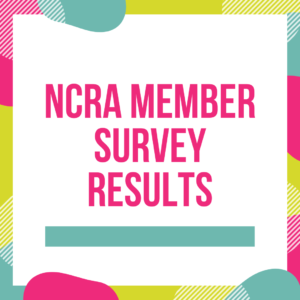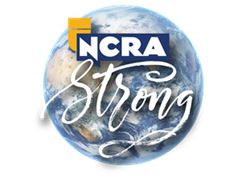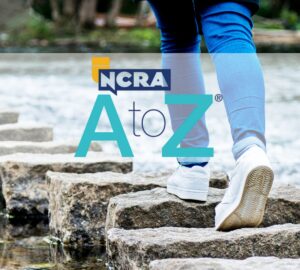Last August, NCRA member Julie Hohenstein, an official realtime court reporter for the Hon. Stephen A. Wolaver, Greene County, Ohio, added a Certified Realtime Reporter (CRR) to the Register Professional Reporter (RPR) certification she already held. Hohenstein said her judge was so happy with her earning the certification that he offered to be interviewed, along with her, to share thoughts on why realtime is a benefit to have as a skill and in the courtroom.
Why did you decide to pursue the CRR credential?
Hohenstein: Ever since the CRR certification became available, I have wanted to achieve it. I think having the CRR says that I am on the cutting edge of my profession both in technology and skill. I think the CRR designation earns me immediate respect among professionals in the court reporting and legal fields.
I had attempted a couple of times when the CRR was first offered, and then I was discouraged because I didn’t pass it. I always knew I could. After attending the 2016 NCRA Convention in Chicago and participating in the CRR seminar and learning more about how the online testing worked, I decided to go ahead and try again.
I really liked the convenience of being able to take the CRR in a setting that I was quite comfortable and familiar with and on a date that I chose. I especially liked the fact that you can take the CRR up to three times in a given quarter.
What do you think are the benefits of realtime?
Hohenstein: For me as the court reporter, I use realtime to improve my writing skills. I watch my realtime to see areas in which I need to improve on my skills. I think no matter who you are, there is always something that we can do to make our writing better.
For the attorneys, I think the benefits are the ability to see and reread what the witness has just said or had said previously.
We use the iCVNet with iPads in our courtroom, and to have at the attorney’s fingertips the ability to search back through the transcript for certain areas of testimony and mark it and then be able to refer to it is an indispensable tool. Also the ability to search a word or phrase and see every single time it is used and to be able to go to that spot with just a tap of the finger is invaluable.
Judge Wolaver, when you first saw realtime, what was the most exciting part of it for you?
Wolaver: Having the knowledge that I would not miss anything, that I could see testimony immediately, it would aid me in making rulings and also the ability with the iPads to search back through the day’s transcript for any discrepancies in witnesses’ testimony. I find that having the iPads with the realtime gives me the flexibility to take the transcript into chambers to review before I make a final ruling, if necessary.
How often do you use realtime, and who in the court uses it? What is your setup like?
Hohenstein: In our courtroom, I provide realtime to the judge and both plaintiff’s and defendant’s counsel on a daily basis. All parties involved use the realtime whenever they feel the need to. Our courtroom is setup with the judge and both counsel having an iPad to receive the realtime feed via Wi-Fi and ICVnet. There have been many times that I have noticed that the defendants themselves have used my realtime.
Have any attorneys, clerks, or deaf or hard-of-hearing jurors or parties used the realtime feed?
Hohenstein: Yes. I have watched both plaintiff’s and defendant’s counsel use the realtime that I provide. Just recently, we had a trial where a potential juror had a severe hearing loss and tinnitus. The juror could let us know that they could not hear any of the Voir Dire examination that was being conducted, and they were able to follow along with the iPad to complete the Voir Dire process.
We also had a 14-day civil trial where both plaintiff’s and defendant’s counsel wanted realtime and a daily rough copy of the day’s proceedings by the end of the day.
What situations do you think that realtime is especially helpful for?
Hohenstein: I find that in all situations realtime is helpful. Realtime helps me if I mishear something a witness says. I can immediately look at the screen and read it again to confirm what I thought I heard the witness say.
Why do you think that realtime is so important that you wanted Julie recognized for pursuing being certified in it?
Wolaver: Julie goes above and beyond and excels in all aspects of her job duties. She has great dedication and respect for her job and wants to always improve her realtime skills for everyone that comes into our courtroom, and the public we serve should know of her dedication to justice.
At a time when many courts are replacing court reporters with ER systems, I find Julie’s realtime skills to be an invaluable asset for what she brings to my courtroom every day. I can’t imagine not having her here.
What would you say to encourage other court reporters to pursue this certification?
Hohenstein: Have the confidence to try it and achieve it. I never thought I would, but deep down I had the desire to pursue and achieve it. I think the sky’s the limit. Just keep working on your writing skills and keep practicing and you too will achieve it. Not everyone can do what we can do, or everyone would do it. Be proud of what you have accomplished.














